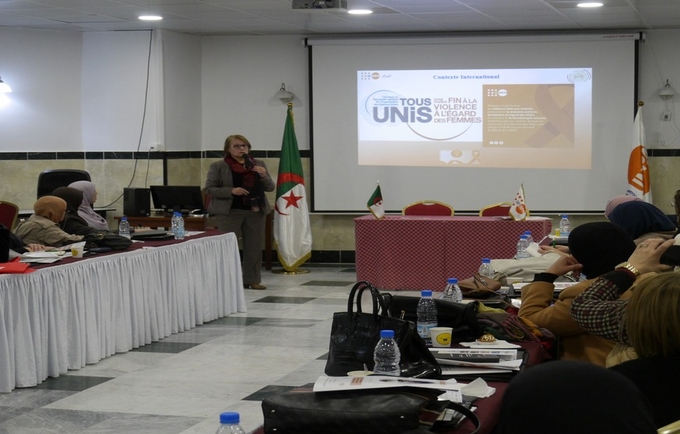Violence against women and girls is a global priority. To this end, the United Nations and States are committed to Sustainable Development goals (SDG) and gender equality. Globally, one in three (03) women is likely to experience physical, psychological or sexual violence during their lifetime. Gender-based violence (GBV) endangers the health, dignity, safety and autonomy of its victims, has serious consequences on their sexual and reproductive health such as forced and unwanted pregnancies, dangerous abortions, sexually transmitted infections, including HIV/AIDS, as well as various traumas that can impact the victim’s vital diagnosis.
The health system remains the place of first resort for women victims of violence. In this context, and within the framework of the 7th cycle of Algeria-UNFPA2023-2027 Cooperation, the Nairobi Summit-2019 which hosted the International Conference on Population and Development (ICPD+25) and the commitments of Algeria, to accelerate the achievement of the ICPD Action Plan and the targets of the Sustainable Development Goals (SDGs), in particular the SDG 5 “achieve gender equality and empower all women and girls”, the Ministry of Health-Direction de la Population and UNFPA, jointly organized, from 3 to 5 December 2023 in Algiers, a training workshop on the clinical management of women/ girls victims of violence.
During three (3 days), 30 health practitioners in reproductive health and family planning, offering their services in Public Establishments of Proximity from 13 wilayas of the country: Algiers-Blida- Boumerdès-Tipaza-Bouira-Médéa- Tizi Ouzou- Béjaia- Ain Defla - Djelfa-Chlef- Laghouat and M'sila shared their experiences, challenges and recommendations in this regard.
The main objective of strengthening the health service providers capacities, training in evaluation protocols and clinical management of victims of violence, as well as orientation and/ or referral procedures, is essential to ensure an effective and empathetic response to this complex problem and contributes to raising awareness of the cultural and social aspects of violence, to promote coordination between the different sectors in order to ensure an adequate and sensitive response to the needs of the survivors with a complete and adapted support to the specific needs of the victims, including referrals to appropriate health services.
In order to be able to recognize the associated signs and symptoms, the training also addresses the cultural and social aspects of violence, including its different types and format (physical, sexual, psychological and economical). The attendees has also the opportunity to develop their skills to conduct sensitive and respectful interviews, allowing victims to share their experience safely, and be trained to collect relevant information while respecting confidentiality and ensuring the physical and emotional safety of the victim.
Another section covered the legal and ethical aspects of dealing with victims of violence, highlighting the importance of informed consent and patients' rights. Health professionals need to be aware of local laws and ethical obligations related to information privacy, while being aware of the potential legal implications of violence, recognizing that some communities might be more vulnerable to certain types of violence because of their social norms and cultural context.
At the end of the workshop, the recommendations of health professionals revolved around concrete measures to promote preventive and protective practices against obstetric violence, the application of the law on health and the code of medical ethics, the implementation of specific interventions aimed at strengthening the skills of health professionals and raising women’s awareness of pregnancy planning and preparation for childbirth, essential pillars to combat obstetric violence and the implementation of monitoring and evaluation tools for better management.


